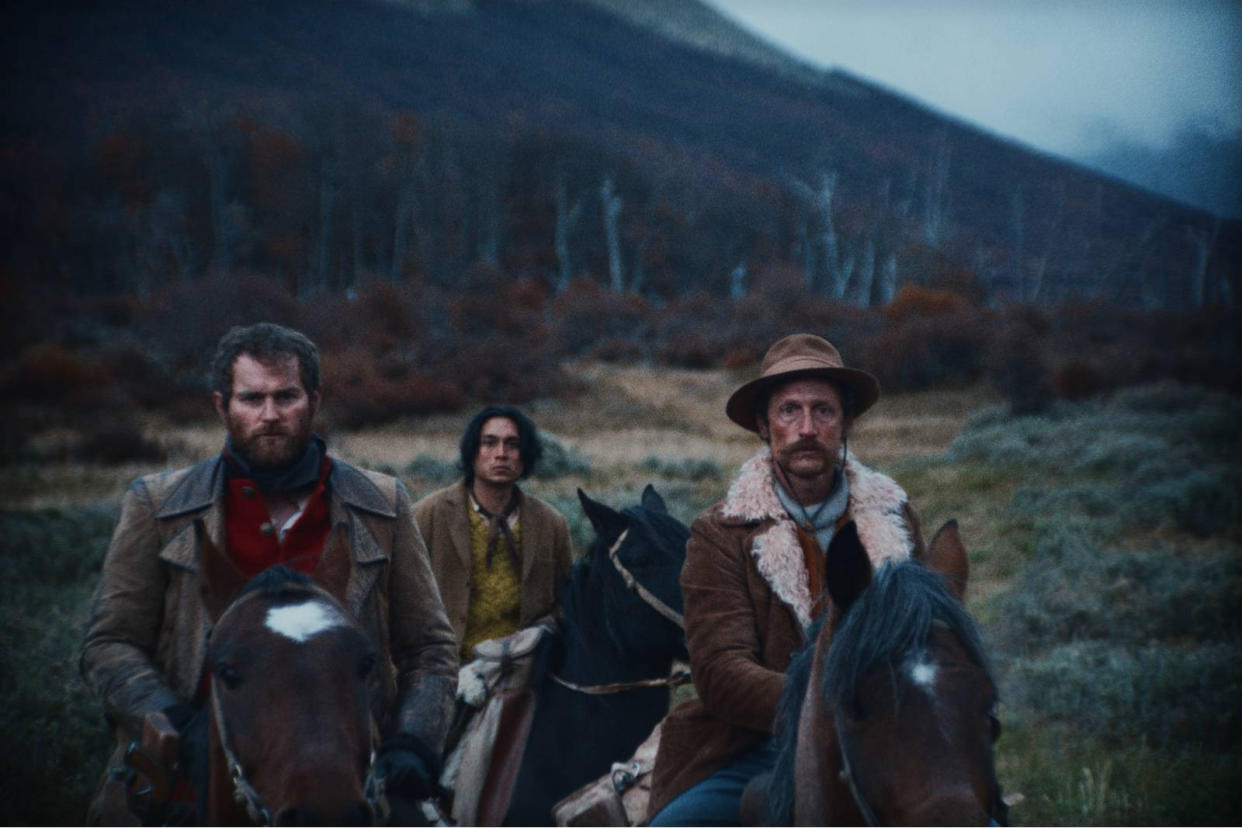‘The Settlers’ Review: A Chilean ‘Killers of the Flower Moon’ Companion Piece


Editor’s note: This review was originally published at the 2023 Cannes Film Festival. MUBI releases the film in select theaters on Friday, January 12.
In Budd Boetticher’s 1959 parable of how we remember violence, “Ride Lonesome,” Randolph Scott confronts the man who killed his wife at the very spot where he murdered her. “That was a long time ago,” the killer said. “I’d almost forgot.” Scott’s reply? “A man can do that.”
More from IndieWire
Watch Before and After Footage as VFX Builds 'Napoleon' Battles from 500 to 50,000 Soldiers
The Worst Part of Jo Koy's Golden Globes Monologue Wasn't the Jokes
So too can a society. Especially when it’s all too convenient to forget things so unpleasant they may shake our very sense of identity. Felipe Galvez’s Chilean Western “The Settlers” may remind some viewers of a Boetticher film when they’re watching it: following three men on horseback on a cross-country journey, it dramatizes questions of identity and belonging, and how these things can be written in violence. Most Boetticher-like, in a tight 98 minutes “The Settlers” says more than a lot of films double its length. It’s one of the most chilling art-Westerns to come along in some time, as provocative for its ideas, dialogue, and characterizations, as for the beauty of its empty landscapes.
It’s the turn of the last century. A wealthy landowner who’s bought up most of Tierra del Fuego, Jose Menendez (a real-life historical figure, whose descendants own much of the land there today), recruits the Scottish military man who manages his security to assemble what men he needs and embark on a mission to exterminate the Indigenous Selk’nam people on his land. The Scot, MacLennan (Mark Stanley), only wants one to accompany him: a mixed-race mestizo, of Indigenous descent himself, Segundo (Camilo Arancibia), who’s barely out of his teenage years. Menendez (Alfredo Castro) isn’t having that, however. The landowner insists that MacLennan also take Bill (Benjamin Westfall), a wily Texan with a strong drawl and a big rep. “Look at him,” Menendez says, pointing to Segundo. “And look at Bill.” Menendez was never going to let MacLennan take only a part-Indigenous boy to kill other Indigenous people.
They set out on their journey across Tierra del Fuego, across landscapes that look more like Iceland than what one typically thinks of as South America. MacLennan, a boisterous boor still wearing his slightly tattered redcoat from the Queen’s army, where he claims he was a lieutenant, is prone to bursting out into song and boasting about what he’s capable of. On one occasion in Egypt, or perhaps the Transvaal, he and his men ate his horse to fend off starvation. “Aww, you can’t eat your horse,” Bill says, acting at times like a caricature of an Old Hollywood cowboy. “That’s like eating a friend.”
That a moment of such relative levity and character-building could then be followed by the chilling scene of their actual massacre of the Selk’nam, and a horrifying moment when MacLennan tries to get Segundo to rape one of the Indigenous women, shows a remarkable ability to switch from one tone to another. Galvez understands that inhuman acts can be committed by people who actually seem quite human at other moments — this is not just a monochromatic landscape of horror — and maybe that’s even more disturbing. Segundo is the one character who remains mostly silent, the film’s observer character and, in a way, moral center, even as complicit as he is in the slaughter himself.
Galvez has constructed a picaresque journey film built around the three travelers meeting different people along the way. That you get such a sense of who everyone is, in addition to depicting the terror of the genocide against the Selk’nam, is a balancing of intimate and epic you wouldn’t expect from a first-time filmmaker. But Galvez, making his feature debut, somehow pulls it off. That he doesn’t underline his points, and leaves certain parts of the story ambiguous, is all the more impressive. He’s made a message movie that isn’t a message movie. And as beautiful as many of the images are, some compositions shot like Dutch Masters paintings by cinematographer Simone D’Arcangelo, it never comes across like Indigenous suffering is just the fodder for art.
“The Settlers,” for all its artistry, is also a deeply felt work of activism with a message that needs to be heard in Chile. Just as nothing about the Pinochet coup in 1973 or the resulting dictatorship is taught in Chilean schools today, so is nothing about the genocide of the Selk’nam, a culture that is considered extinct, with only one living person today able to speak their language.
Galvez’s film will likely be controversial in its home country in a way that another film, also debuting at Cannes 2023, won’t be in its own: Martin Scorsese’s “Killers of the Flower Moon.” The genocide and displacement of Native Americans is more widely taught in the U.S., but Scorsese’s film also illuminates a particular slice of that history that many viewers may be unfamiliar with. Each of these movies is arriving from very different places — one a debut film, the other from an old master, one made for very little, the other for around $200 million. Hopefully, the attention “Killers” gets will rub off on “The Settlers,” which could use it. This is a film that shows that, as easy as it is to forget about the past, it’s easier still when it was never taught in the first place.
Grade: A-
“The Settlers” premiered at the 2023 Cannes Film Festival.
Best of IndieWire
Sign up for Indiewire's Newsletter. For the latest news, follow us on Facebook, Twitter, and Instagram.
